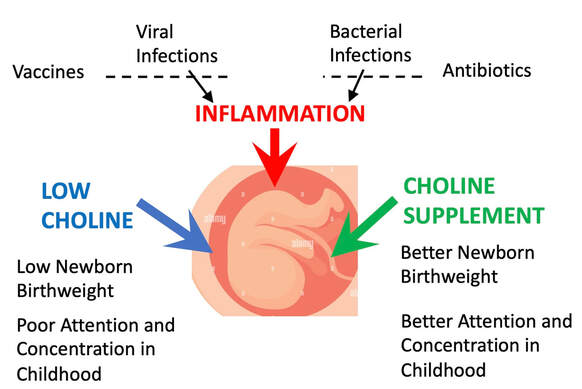Menu
CoronaVIRUS, FLu, and Other infections
Vaccines and antibiotics are the first line of protection for the mother and the baby if the mother is exposed to infection from viruses or bacteria. Infection leads to inflammation, which affects the nourishment of the baby and also slows its brain development. Maternal choline supplements can help protect the placenta and the baby’s development. However, if maternal choline levels are low, the baby may be small at delivery and have poor attention and concentration as a child.
If you are infected, is the baby infected? For some infections, like Zika and untreated HIV, the answer is yes, the baby can be infected. For more common infections--COVID-19 and other respiratory infections, flu, urinary and vaginal infections and even colds, the baby is protected from the infections by the placenta and lining of the uterus.
If the baby is not infected, can the baby still be harmed? Despite this protection, these common infections still have adverse effects on prenatal brain development and increase the risk for later autism spectrum disorder, attention deficit disorder, and schizophrenia. When you get a respiratory infection or flu or a severe urinary tract infection, you have a sick feeling early in the illness. You know you want to be in bed. That feeling is caused by your body’s early defense system, the cytokine system. Your blood cells release the cytokines and the cytokines attack anything that looks foreign. The attack includes the placenta, which compromises its ability to support the baby’s brain development. Two of every 5 women will become infected in pregnancy.
Should I get vaccinations? What about my husband and other children? Yes! A flu or COVID shot is not absolute protections but it helps and you should get it. So should your husband and other close relatives. These shots not only protect mothers directly, but also indirectly by preventing others around her from getting infected and spreading it to her. That is called “herd immunity.” The new RSV vaccination for your 8th month of pregnancy is also important. Many babies die from RSV in the first year of life. If you get the vaccine, you protect yourself and that protects your baby in two ways—you are less likely to get RSV yourself and then infect the baby, and you pass your RSV antibodies from your vaccination to the baby with your colostrum, the fluid from your breast before your milk comes in.
Do choline and prenatal vitamins help? Higher levels of choline and folic acid protect the baby’s brain development. Very high choline levels, obtainable with supplements, appear to block much of the adverse effect of common infections. Infections are often unpredictable and can happen to any woman! Choline and folic acid supplements are effective, but only if given before the infection occurs. Like a flu shot, they are a good preventative measure to protect your baby in case you are exposed to infections.
Read more: Higher gestational choline Levels in maternal infection are protective for infant brain development.
Maternal choline and respiratory coronavirus effects on fetal brain development.
Proudly powered by Weebly
